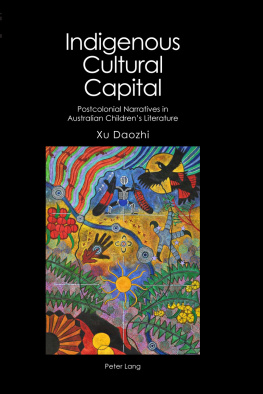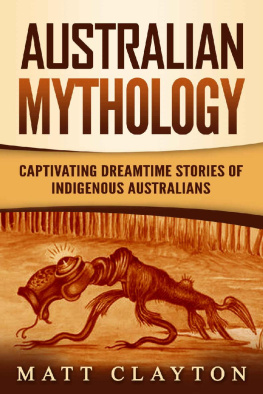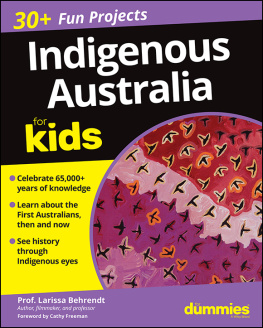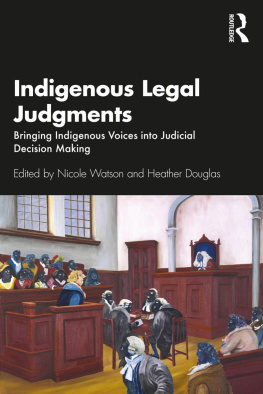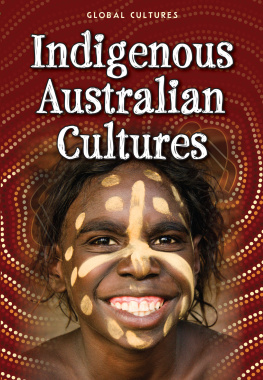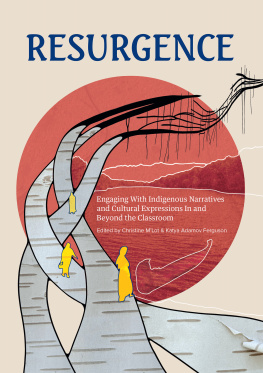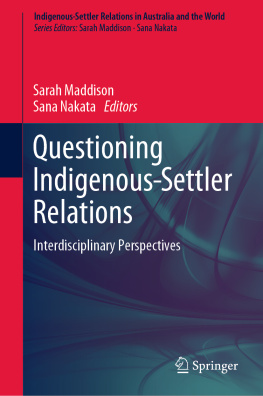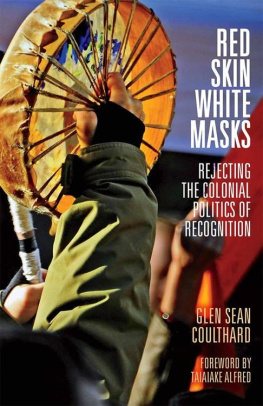Contents
Page List
AUSTRALIAN STUDIES: INTERDISCIPLINARY PERSPECTIVES
Series Editor
Anne Brewster
Associate Professor,
University of New South Wales
Volume 2
PETER LANG
Oxford Bern Berlin Bruxelles New York Wien
Indigenous
Cultural
Capital
Postcolonial Narratives in
Australian Childrens Literature
Xu Daozhi
PETER LANG
Oxford Bern Berlin Bruxelles New York Wien
Bibliographic information published by Die Deutsche Nationalbibliothek.
Die Deutsche Nationalbibliothek lists this publication in the Deutsche National-bibliografie; detailed bibliographic data is available on the Internet at http://dnb.d-nb.de.
A catalogue record for this book is available from the British Library.
Library of Congress Cataloging-in-Publication Data
Names: Xu, Daozhi, 1985- author.
Title: Indigenous cultural capital : postcolonial narratives in Australian childrens literature / Xu Daozhi.
Other titles: Postcolonial narratives in Australian childrens literature
Description: Oxford ; New York : Peter Lang, [2018] | Series: Australian studies: interdisciplinary perspectives ; 2 | Includes bibliographical references and index.
Identifiers: LCCN 2018005642 | ISBN 9781787070776 (alk. paper)
Subjects: LCSH: Childrens literature, Australian--History and criticism. | Indigenous peoples in literature. | Postcolonialism in literature.
Classification: LCC PR9613.9 .X8 2018 | DDC 820.9/92820994--dc23 LC record available at https://lccn.loc.gov/2018005642
Cover illustration: Rod Garlett, Noongar Boodja Wangkiny (Our Land is Talking) (2017). 150 x 110 cm. Acrylic on Belgian Linen. Created as part of the Vice Chancellors commission for NAIDOC 2017, in conjunction with Kurongkurl Katitjin, Edith Cowan University Perth Australia.
Cover design by Peter Lang Ltd.
ISSN 2297-8194
ISBN 978-1-78707-077-6 (print) ISBN 978-1-78707-078-3 (ePDF)
ISBN 978-1-78707-079-0 (ePub) ISBN 978-1-78707-080-6 (mobi)
Peter Lang AG 2018
Published by Peter Lang Ltd, International Academic Publishers,
52 St Giles, Oxford, OX1 3LU, United Kingdom
Xu Daozhi has asserted her right under the Copyright, Designs and Patents Act, 1988, to be identified as Author of this Work.
All rights reserved.
All parts of this publication are protected by copyright.
Any utilisation outside the strict limits of the copyright law, without the permission of the publisher, is forbidden and liable to prosecution.
This applies in particular to reproductions, translations, microfilming, and storage and processing in electronic retrieval systems.
This publication has been peer reviewed.
About the author(s)/editor(s)
Xu Daozhi completed her PhD in English literary studies at the University of Hong Kong (HKU) and is now a senior research assistant in the Faculty of Education at HKU. Her research interests include postcolonial studies, cultural theory, childrens literature, and studies of race and ethnicity. Her scholarly articles have appeared in Australian Aboriginal Studies, Papers: Explorations into Childrens Literature, and Antipodes.
About the book
This book explores how Australian Indigenous peoples histories and cultures are deployed, represented and transmitted in post-Mabo childrens literature authored by Indigenous and non-Indigenous writers. Postcolonial narratives in Australian childrens books enable readers access to Indigenous cultures, knowledge and history, which bring with them the possibility of acculturation. This process of acquisition emerges as an embodiment of cultural capital, as theorised by Pierre Bourdieu, but carries an alternative, anti-colonial force. This book argues that by affirming Indigenous cultural value and re-orienting the instituting power of recognition, the operation of Indigenous cultural capital enacts a tactic of resistance and functions with transformative potential to change the way in which cultural relations are reproduced in settler society. Through examining the representation, formative processes, modes of transmission, and ethical deployment of Indigenous cultural capital, this book provides a fresh perspective on postcolonial readings of childrens literature. In doing so, it makes original contributions to literary criticism and significant theoretical advances to postcolonial scholarship.
This is a groundbreaking discussion of the representation of Aboriginal people in childrens literature. Importantly the book confirms Aboriginal agency through the deployment of indigenous cultural capital. The analysis of the circulation of cultural capital in Aboriginal writing is a significant and timely intervention into indigenous studies.
Bill Ashcroft FAHA, Australian Professorial Fellow, University of New South Wales
In this persuasive, deeply researched study, Xu Daozhi demonstrates that Australian childrens books are powerfully invested in Aboriginal cultures. An impassioned call to see childrens books with fresh eyes, Indigenous Cultural Capital examines works by Aboriginal and non- Aboriginal writers, investigating the ethics of representation and the issues associated with publication and reception.
Clare Bradford, Emeritus Professor, Deakin University
This eBook can be cited
This edition of the eBook can be cited. To enable this we have marked the start and end of a page. In cases where a word straddles a page break, the marker is placed inside the word at exactly the same position as in the physical book. This means that occasionally a word might be bifurcated by this marker.
| v
To My Family
| ix
This book is based on research undertaken for a PhD at the University of Hong Kong, although in many respects it had an earlier genesis. My background is in literary studies, which exposed me to the insights and limitations of postcolonial theory, issues related to race and representation, and the vexed debates over speaking positions. Although the situation is very different in respect to many of Chinas ethnic minorities, there are certain resonances such as the conundrums in cultural continuity and revitalisation. Hence the issues germane to this book have long been shaping my thoughts. Serendipitously the pertinence of childrens literature and its comparatively few critiques was brought to my attention, so I turned my focus to this body of work, which also allowed me to combine my long interest in Australia and Australian Indigenous peoples and cultures.
While the discussion of childrens books that draw on Indigenous life and cultures as Indigenous cultural capital is inextricably entangled with the question of whose voice Indigenous or non-Indigenous is speaking in the texts, the concept of Indigenous cultural capital is more concerned with representations, formative processes, modes of transmission, and ethical implications: what message this or that voice expresses, how is it articulated, and what role it plays in knowledge production and exchange. This book therefore explores a set of intertwined questions pertaining to how Indigenous Australians are positioned, represented, and self-represented in childrens books that are authored by Indigenous and non-Indigenous writers and published in the post-Mabo era.
This book would not have been completed without the help, guidance, suggestions, and advice that I have received from the very beginning of my PhD study; they are invaluable gifts for which I would like to extend my sincere thanks. First, I want to express my deepest gratitude to Otto Heim, my PhD supervisor, for his intellectual generosity, unfailing support, and rigorous guidance, which have led me through the completion of my doctoral thesis and the final revision of this book manuscript. I am also deeply ix | x grateful to Clare Bradford. Her scholarship in postcolonial criticism of childrens literature initiated me into this field. I am very thankful for her tremendous help, insightful advice, and constant support over the years, especially during my two research visits at Deakin University. I am particularly grateful to Mitchell Rolls for reading drafts of the entire manuscript, offering his insights and helpful suggestions. His unfailing encouragement and enormous support gave me much confidence in completing this book and furthering my academic pursuit in Australian studies. I am indebted to June Senyard for her kindness and generous help since my postgraduate study. She has read my Masters and doctoral theses and part of this book manuscript. Every time she gave me detailed comments, helpful guidance and constant encouragement. I am also thankful to Zhang Yongxian for his supervision when I studied at the Australian Studies Centre, Renmin University of China. I express my heartfelt thanks to David Walker and Karen Walker for their wisdom and humour and for helping me build up my academia career. I also express my appreciation to Colin Mackerras for his erudition, inspiring conversations, and cheerful encouragement.

